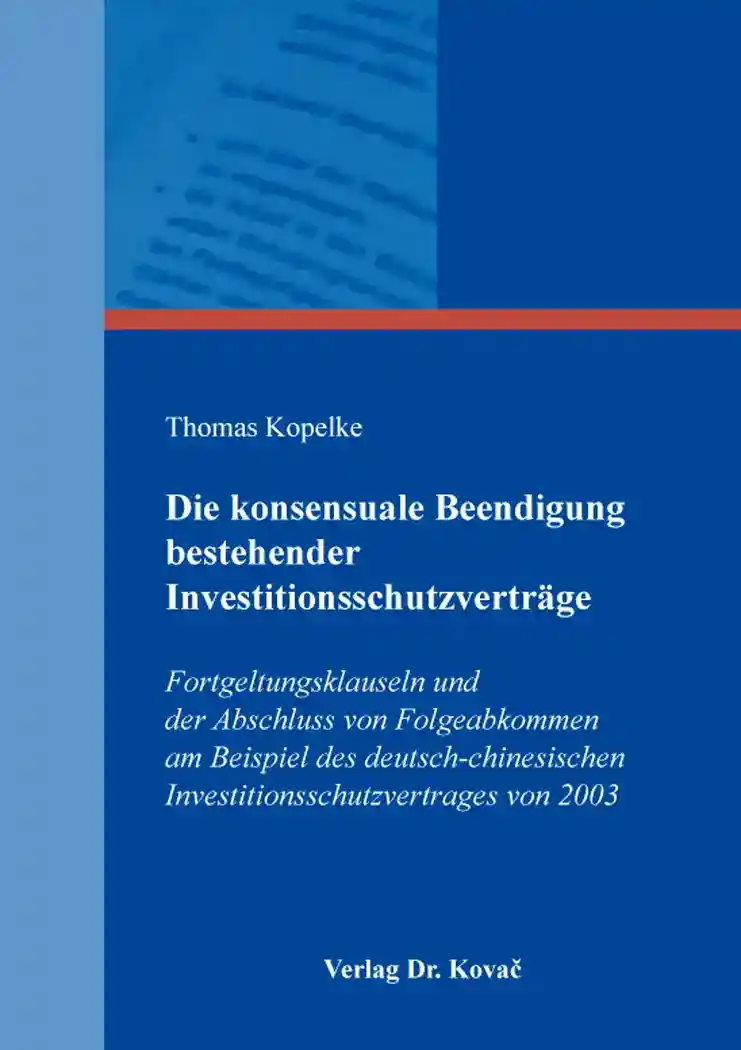Thomas KopelkeDie konsensuale Beendigung bestehender Investitionsschutzverträge
Fortgeltungsklauseln und der Abschluss von Folgeabkommen am Beispiel des deutsch-chinesischen Investitionsschutzvertrages von 2003
Studien zur Rechtswissenschaft, volume 461
Hamburg 2021, 204 pages
ISBN 978-3-339-12462-3 (print) |ISBN 978-3-339-12463-0 (eBook)
About this book deutschenglish
Terminations of existing bilateral investment treaties (BITs) by mutual consent are increasingly observed. The termination of a BIT in favour of a follow-up agreement takes on a role that is to be regarded as differentiated as soon as a member state of the EU is a party to the agreement. This is due to the considerable expansion of the EU’s competences to shape the common trade policy in accordance with Article 3 paragraph 1 lit. e in conjunction with Article 206 and Article 207 of the Treaty on the Functioning of the European Union (TFEU).
This includes, among others, the competence to conclude treaties for bilateral investment protection agreements: Unlike before, this is no longer the responsibility of the EU member states. Instead, the protection of foreign direct investment is fundamentally part of the common trade policy and is the exclusive responsibility of the EU. Although this circumstance does not initially justify the termination of existing member state BITs, it is the EU’s ambition to gradually create a European standardization of investment protection. This goes hand in hand with the negotiation of new EU BITs in an environment that has so far been characterised by existing BITs of the EU member states. The parallel existence of BITs for the duration of their survival clause should be avoided in order to counteract false incentives such as treaty shopping or forum shopping.
It is therefore questionable whether a survival clause contained in a BIT can remain in force if the contracting parties terminate or replace the agreement by mutual consent. In addition, it is questionable whether EU BITs to be concluded in the future can be granted exclusive applicability immediately after entry into force against the background of existing survival clauses.
In order to clarify these questions, the focus is also on how the EU competence structure affects agreements to be replaced and whether an investor-state dispute settlement clause can be revoked by mutual consent of the BIT contracting parties vis-à-vis the investors. The provisions of the German-Chinese BIT are used as an example to illustrate this.
Keywords
BITChinaDeutschlandFortgeltungsklauselGerechte und Faire BehandlungICSIDInternationales RechtInvestitionsschutzrechtInvestitionsschutzvertragInvestor-Staats-StreitschlichtungKompetenzübertragungLegitime ErwartungenMeistbegünstigungSchiedsgerichtsbarkeitSchutzstandardsSurvival ClauseWiener VertragsrechtskonventionWirtschaftsrechtIhr Werk im Verlag Dr. Kovač

Möchten Sie Ihre wissenschaftliche Arbeit publizieren? Erfahren Sie mehr über unsere günstigen Konditionen und unseren Service für Autorinnen und Autoren.
